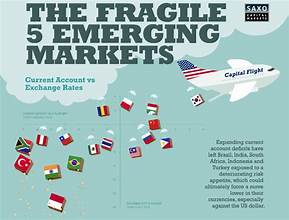
As we step into 2024, the global market landscape is evolving rapidly. Businesses and investors must stay ahead of these emerging trends to navigate the complexities and seize opportunities in a shifting economic environment. This article explores the key factors shaping the future of global markets, focusing on emerging market trends that will define 2024.
1. Accelerated Digital Transformation
Digital transformation has been a major trend in recent years, but 2024 is expected to see an accelerated pace. Companies across various sectors are leveraging advanced technologies such as artificial intelligence (AI), blockchain, and the Internet of Things (IoT) to enhance efficiency and create new business models.
- AI and Automation: AI-driven automation is revolutionizing industries by improving operational efficiency and reducing costs. Businesses are adopting AI for predictive analytics, customer service, and supply chain management.
- Blockchain Technology: Blockchain is gaining traction beyond cryptocurrencies, with applications in supply chain transparency, secure transactions, and smart contracts.
- IoT Integration: IoT devices are becoming more prevalent, providing real-time data and insights that help businesses make informed decisions and improve customer experiences.
2. Sustainability and Green Investments
Sustainability is no longer a choice but a necessity for businesses aiming to thrive in 2024. Investors and consumers are increasingly prioritizing eco-friendly practices and green investments.
- Green Technologies: Investments in renewable energy sources, such as solar and wind, are on the rise. Companies are also focusing on energy-efficient technologies and sustainable manufacturing practices.
- Regulatory Pressures: Governments worldwide are implementing stricter environmental regulations, pushing companies to adopt greener practices to comply and avoid penalties.
- Consumer Preferences: Consumers are becoming more conscious of their environmental footprint, favoring brands that demonstrate a commitment to sustainability.
3. Shifts in Global Trade Dynamics
The global trade landscape is undergoing significant changes, influenced by geopolitical developments and trade policies.
- Regional Trade Agreements: New trade agreements and partnerships are shaping global trade flows. Regional agreements, such as those within the Asia-Pacific region, are expected to influence trade dynamics significantly.
- Supply Chain Resilience: The COVID-19 pandemic highlighted vulnerabilities in global supply chains. Businesses are focusing on diversifying their supply chains and building resilience to mitigate disruptions.
- Tariff Changes and Trade Policies: Changes in tariffs and trade policies by major economies, such as the US and China, will impact global trade patterns and market access.
4. Emergence of New Consumer Behaviors
Consumer behavior is evolving in response to technological advancements and changing societal norms. Understanding these shifts is crucial for businesses looking to capture new market opportunities.
- Digital Consumption: The rise of digital platforms has transformed how consumers shop and engage with brands. E-commerce and mobile commerce are experiencing significant growth.
- Personalization and Experience: Consumers expect personalized experiences and products tailored to their preferences. Companies are using data analytics to deliver targeted marketing and customized offerings.
- Health and Wellness Focus: There is an increasing focus on health and wellness, with consumers seeking products and services that promote a healthy lifestyle.
5. Advancements in Financial Technologies
Financial technologies (fintech) continue to disrupt traditional financial services, offering innovative solutions for managing money, making transactions, and accessing credit.
- Digital Wallets and Payments: Digital wallets and payment solutions are becoming mainstream, providing consumers with convenient and secure ways to manage their finances.
- Cryptocurrencies and DeFi: Cryptocurrencies and decentralized finance (DeFi) are gaining popularity, offering alternative investment opportunities and financial services.
- Regulatory Developments: As fintech evolves, regulatory frameworks are also adapting to address new challenges and ensure consumer protection.
6. Focus on Mental Health and Well-Being
The importance of mental health and well-being is gaining recognition in the workplace and beyond. Companies and organizations are implementing initiatives to support mental health and create positive work environments.
- Employee Well-Being Programs: Organizations are investing in employee well-being programs, including mental health support, flexible work arrangements, and wellness initiatives.
- Work-Life Balance: The emphasis on work-life balance is driving changes in workplace policies and practices, promoting a healthier and more productive work environment.
Conclusion
As we navigate 2024, staying informed about emerging market trends is essential for making strategic decisions and remaining competitive. The accelerated pace of digital transformation, growing emphasis on sustainability, shifting global trade dynamics, evolving consumer behaviors, advancements in financial technologies, and the focus on mental health are key factors shaping the future of global markets. By understanding these trends, businesses and investors can better position themselves for success in the dynamic landscape of the year ahead.













